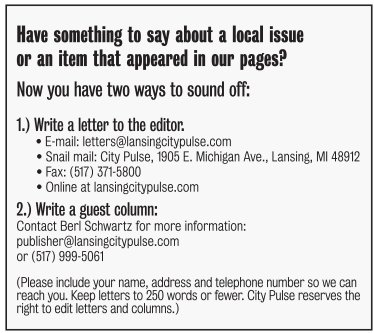Ingham County is one dirty needle away from an HIV or Hepatitis B outbreak.
Don’t believe me? Ask the folks in Austin, Ind. One drug user there became infected with HIV. Within a year, 190 cases of HIV linked to needle sharing had been identified in the rural community. In an average year, Austin would have seen five cases of HIV.
 Indiana law forbade needle exchanges, and former Gov. Mike Pence hemmed and hawed about establishing one for months as the outbreak ramped up. Finally, after 100 cases had been found, he declared a health emergency and authorized a temporary needle exchange. But the damage was done.
Indiana law forbade needle exchanges, and former Gov. Mike Pence hemmed and hawed about establishing one for months as the outbreak ramped up. Finally, after 100 cases had been found, he declared a health emergency and authorized a temporary needle exchange. But the damage was done.
Ingham County has the highest HIV prevalence rate in the state outside of Detroit. And our Hepatitis B rates are nearly three times the state rate. Both, as well as Hepatitis C, are easily transmitted by sharing needles. With our increasing opioid crisis, particularly heroin-related overdoses, it is only a matter of time before those infectious diseases breakout in the needle using community.
But we have a way to prevent that from happening. The Ingfham County Community Health Center board of directors, on which I serve as vice chairman, recognized the opioid crisis as an urgent issue. We also recognized the potential impact of infectious disease on the needle-using community.
We authorized an ad hoc committee on needle exchange programs to determine if the county needed one, and, if so, what the obstacles to implementing one might be.
The committee met over the course of 10 months. In August last year, it approved a report that found that needle exchanges work to prevent infectious disease among needle users and that Lansing and the county needed to establish one.
The committee’s final report also determined that there is no evidence that syringe-access programs increase needle use. Just the opposite: Substantial evidence exists that such programs are a first step toward accessing recovery for addiction.
The committee’s recommendations have been adopted by both the Ingham Community Health Centers and the Ingham County Board of Commissioners.
Ingham County Health Officer Linda Vail earlier this year convened a working group to implement a syringe access program in the county. I have been appointed to chair that working group, which includes representatives from the Health Department, Lansing Area AIDS Network, Lansing City Council and the healthcare industry in mid-Michigan.
During the committee process, we learned that an obstacle to implementing a syringe access program was a quirk in Lansing’s drug paraphernalia ordinance compared to the state law.
Lansing’s drug paraphernalia ordinance does not include authorization for distribution of sterile syringes to prevent infectious disease, but the state law does.
On Monday, Councilwoman Jody Washington will introduce an ordinance amendment to bring the city law in line with state law. It’s an important step in clearing the path for a syringe access program in the city.
Washington and other Council members have asked that I present the findings of the ad hoc committee to the City Council in the coming weeks. As vice chairman of the health center board, chairman of the working group and a person well versed in the ongoing HIV crisis, I fully support the implementation of a syringe access program in the county — and so does City Pulse.
This is a common-sense, proven harmreduction intervention that reduces the disease burden not only on the needle using community, but in our community as a whole.
Detroit, Flint, Ypsilanti and Grand Rapids all have syringe access programs. Lansing should be the next — and frankly, ought to have been the first.
Support City Pulse - Donate Today!
Comments
No comments on this item Please log in to comment by clicking here